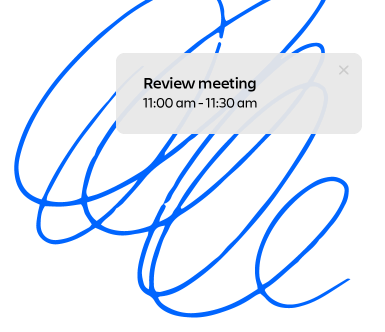Meetings are ineffective
72% of the time
They aren’t evil, they’re just poorly done. Our research revealed that the meeting culture at most organizations actually makes it harder for teams to reach their goals.

Can’t get a word in
A handful of voices tend to dominate the conversation, leaving most attendees struggling to contribute their thoughts. So much wasted potential.
No clarity on next steps
Too many people leave meetings with no idea what’s happening next. No decisions were made, and nobody knows what’s expected of them.
Information on repeat
Sitting through an announcement for the fourth or fifth time is mind-numbing. No wonder people sneak in other work during meetings.
Could’ve been an email
Few things are more irritating than being forced to listen to information that could be read in half the time – all while tasks pile up and work sits unfinished.
Conversational chaos
Without a clearly stated purpose (and dare we suggest: an agenda?), meetings lack focus. Picture a pinball machine. The discussion is the ball.
Productivity
Meetings are overused,
leaving workers overloaded
Teams need a collection of collaboration techniques, tailored to various needs – a Swiss army knife, if you will.
But we found too many teams have only one tool: meetings. And when you’re holding a hammer, everything looks like a nail.
78% of people we surveyed say they’re expected to attend so many meetings, it’s hard to get their work done. 51% have to work overtime at least a few days a week due to meeting overload, and for those at the director level and up, that number rises to 67%.
Meanwhile, 76% agree they feel drained on days when they have a lot of meetings. Nobody is having fun here.
78%
78% of people we surveyed say they’re expected to attend so many meetings, it’s hard to get their work done

51%
51% of people we surveyed have to work overtime a few days a week due to meeting overload
Take control of your calendar
80% of respondents say they’d be more productive if they spent less time in meetings. But that’s easier said than done. For 54% of knowledge workers, meetings dictate the structure of each day instead of time for “real work” taking priority. If that sounds familiar, why not flip the script? We tried it and had great results.
Get all the data and details here

- Decline low-priority meetings and group the rest together to free up focus time.
- Block time on your calendar for commitments like school drop-offs and appointments.
- Schedule 90-120 minute blocks for deep work – ideally, 30-40% of your week.
- Schedule “open collaboration” blocks throughout your week to allow for impromptu work sessions with teammates – ideally, 10-20% of your week.
- Schedule “respond to messages” time so you aren’t tempted to check notifications in real time. (Tip: think about when your brain is best suited for this work – after lunch or after a block meetings, perhaps?)
Note to leaders! Remember that you set the tone for your team. Make sure everyone knows that declining a meeting doesn’t signal less engagement – just better prioritization.
Now trending: async video
Video messaging is taking off in the workplace,
with views on Loom’s platform up 37% in 2023.
Why the surge of interest? Simple. Video messages are easier to create than an email and faster to consume than a meeting. Platforms like Loom let teammates get up to date at their convenience, with the option to watch at up to 2x speed or just read an AI-generated transcript. Best of all, video messages convey emotion and personality in a way that text can’t. It’s just more…human.
More async strategies from Loom
77 million
77 million Loom videos recorded in 2023.
28%
Loom customers had 28% fewer meetings in 2023 (compared to 2022). Coincidence? We think not.
Effectiveness
Meetings don’t achieve
the desired outcomes
Despite meetings’ near-monopoly on group collaboration practices, they often fail to deliver.
For example, many managers try to build personal connections between teammates by bringing them together in meetings. Yet 55% of people say they feel lonely at work, even on days when they attend lots of meetings.
54%
of workers frequently leave meetings without a clear idea of next steps or who owns which task
The same goes for nearly every meeting motivation. We asked about making decisions as a group, providing status updates, getting on the same page about their goals, and more. What we heard over and over is that meetings aren’t getting the job done.
Folks we surveyed said meetings are ineffective for…
Connecting with colleagues
Brainstorming new ideas
Making decisions with others
Driving work forward
Creating goal clarity
Status updates
What are meetings effective for?
Turns out meetings are really effective for one thing: generating more meetings! 77% of workers we surveyed say they’re frequently in meetings that end in a decision to schedule a follow-up meeting.


Culture
Don’t cancel all your meetings
(just make them better)

Meetings will always be a part of teamwork. But they don’t have to suck! Our research uncovered some strong clues as to how to improve the meetings we can’t eliminate.
Get this: 62% of workers often attend meetings that didn’t even state a goal in the invite. Talk about low-hanging fruit!
It only takes a few words to tell folks what you hope to accomplish, and they’ll arrive with their brains primed and ready to go.
62%
of workers often attend meetings that don’t state a goal in the invite.
But why stop there? An agenda leads to more productive meetings, according to 79% of respondents. Yes, agendas take time to create, but the ROI looks promising.
Next, 30-minute meetings have practically become cemented as the default. Yet 80% of workers say most of their meetings could be done in half the time. So put that to the test by switching to 15 minutes as the default setting in your calendar app. Longer meetings are perfectly fine, but let that be a conscious choice.
Last, nearly half of respondents (43%) complain that a few people tend to dominate meetings, making it hard to participate in the conversation. A good facilitator can prevent this or course-correct in the moment. Still, many people need time to take in the full context before sharing their ideas (think: introverts). So before the meeting, create a page with your goals and discussion topics using our Meeting Notes template. Send it around so people have a chance to contribute their ideas as page comments and/or collect their thoughts ahead of time.

- Include a goal on your meeting invite
- Craft a meeting agenda beforehand
- Swap your 30-minute meetings for 15 minutes
- Engage a meeting facilitator to make sure that a few voices aren’t dominating the conversation
- Use our Meeting Notes template so people
can contribute their ideas ahead of time
Note to leaders! It’s especially important that you adopt these better-meeting behaviors. You’re often the ones organizing the meeting, and you have an outsized influence on culture. But you don’t have to make all the changes all at once. Start with whatever feels manageable, and build from there.
The art of saying “no”
Sometimes it’s hard to find the right words. So we rounded up a collection of canned responses you can use to deflect meetings and regain control of your calendar.

Flip to play!
Schedule
savvy

“
I’m trying to cluster my meetings together to create a focus block that day. Looks like everyone is free at 3:30 – would that work, instead?

Family
friendly
“
I’ll have to take this call from the road. Going to visit my Nana for the weekend!

Outdoorsy

“
Let’s make this a walking meeting. Tryin’ to get my steps in!

Hot potato

“
Thanks for thinking to include our team, but Ingrid is actually a better representative. She’ll attend in my place.

AI
generated
“
Hi. Thanks for the invite. Unfortunately, I can’t attend. Please share any notes or updates post-meeting. Best.
Empathetic

“
Could you please share your goal for this meeting and a rough agenda? I want to make sure I can add value before putting this on my calendar.
To meet or not to meet
Use this tool to see what style of meeting suits your purpose…
or whether you need a meeting at all!
Reclaim your day
There’s no magic cure for meeting overload. But there are ways to tame the madness.
If you’re ready to be the change you seek, these are the first steps we recommend based on our own experience:

Calendar audit
Look for meetings you can get rid of, challenge, or stop attending. For the meetings you can’t eliminate, try to cluster them together to create space for focused work. Don’t forget to block time for workouts, drop-offs, and other “life admin,” too.
Try async video
So long, status meetings! When you just need to broadcast information, use Loom to share it in video messages instead. You’ll retain that “human touch” while allowing your audience to watch when it suits their schedule. Win-win!
Deflect meetings with documents
Whether it’s a quarterly plan, project pitch, or technical design, first share your idea on a Confluence page and let people comment on it async. Based on the feedback you get, you might decide a live follow-up discussion is needed. Or maybe not!
Put it in writing
Use the Meeting Notes template in Confluence to organize your thoughts and communicate your agenda. Then during the meeting, track decisions and next steps on the same page – it’s all in the template!
Reduce, reschedule, reflect
Run the Ritual Reset play with your team. Together, you’ll take a fresh look at your recurring meetings and determine which ones still have value, which need an overhaul, and which should just get the boot.
Boost your meeting facilitation skills
Designed by Atlassian’s work futurists, this course offers research-backed insights and practices that help you run better meetings. And it’s free!
Atlassian hates useless meetings as much as anybody else (maybe more).
As a living laboratory for teamwork, we’ve been developing collaboration tools and experimenting with teamwork practices for over 20 years. For more tips you can take back to your team, be sure to check out our Work Life blog and the Atlassian Team Playbook. Because eliminating annoying meetings is impossible alone.













































